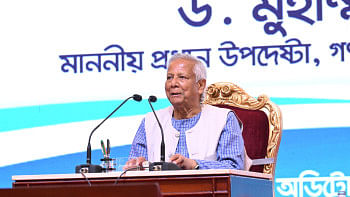Prime minister's visit to Bhutan
BHUTAN (Druk Yul -- the land of the Thunder Dragon) is a land-locked country located between India and China. It shares 470 km border with China and 605 km with India, out of its total border of 1,075 km. Since the mountains are very high on the north, its connectivity on land with the external world lies in the south through India.
Bhutan lies to the north of Bangladesh and is separated by 30 km of Indian territory. It was the second country to recognise Bangladesh -- on December 7, 1971 -- after India's recognition on December 6, 1971.
Prime Minister Sheikh Hasina's visit to Bhutan is a testimony to the implementation of Bangladesh's foreign policy of cooperation with neighbouring countries for mutual benefit. She is also expected to visit India in December.
The four-day visit of the prime minister was her first to any Saarc country after her assumption of office as the head of the government. A 24-member delegation including Foreign Minister Dr. Dipu Moni accompanied the prime minister.
It is noted that the prime minister arrived on the day of the second anniversary of the accession to the throne by the king of Bhutan.
The prime minister was accorded a warm welcome on her arrival at Paro Airport. She was received by Bhutan's Prime Minister Jigme Y. Thinley and his wife.
She was led in a procession from the airport to Thimpu, Bhutan's capital city, with school children and Bhutanese people lined up along the highway with Bangladesh's flag.
The prime minister discussed bilateral and regional matters with King Jigme Khesar Namgyel Wangchuk, former king Jigme Singye Wangchuk , Prime Minister Jigme Thinley and other dignitaries.
The issues that reportedly dominated the talks were increasing trade, opening more transit land points between Bangladesh and Bhutan including direct bus service, transit rights for Bhutan's use of Bangladesh's sea ports, combating effects of climate change, and export of hydro-power.
Both sides reportedly agreed to take steps in these matters. A trade agreement was signed between the two countries, updating the 1980 agreement, during the visit.
The Bangladesh prime minister handed over some earthquake relief materials to her counterpart on November 7. On September 21, Bhutan was hit by the 6.1 magnitude earthquake in which at least 10 people died, monasteries were damaged and homes collapsed.
Bilateral relations
As early as April 1972, both countries expressed the desire to establish close relations. The first official commercial contact between Bhutan and Bangladesh began in the late '70s, and in 1978 a Bangladesh trade delegation paid a visit to discuss the prospect of bilateral trade. A trade agreement was concluded in September, 1980.
Bangladesh opened its diplomatic mission in January, 1980 headed by a resident ambassador. Likewise, Bhutan appointed an ambassador to Bangladesh in the same year.
Last October, Bhutan proposed signing of a free trade agreement with Bangladesh. In fiscal 2007-08, Bangladesh imported goods worth $13.73 million from Bhutan while its exports to Bhutan amounted to only $1.35 million
Bangladesh imports from Bhutan mainly boulders, dolomite, gypsum, dust coal, slate, graphite, timber and fruit products, and exports to Bhutan include consumer goods, pharmaceuticals, jute products, newsprint, chemicals, detergents and light machinery.
Bhutan's Seed Corporation signed an agreement in February 2000 with a non-government organisation (Brac) in Bangladesh to supply onion and radish seeds.
Both nations are members of Saarc and are keen to develop the regional forum into a dynamic and vibrant one. They are Least-Developed Countries and have a common approach to economy related policies in the multi-national forums. Both joined the Non-Aligned Movement in 1973. Both are parties to the 1970 Nuclear Non-Proliferation Treaty.
Bhutan Airlines operates between the two countries and people-to-people contact has increased considerably. The visit will further strengthen bilateral relations between the two countries.
Democracy in Bhutan
The year 2008 saw a remarkable change in Bhutan. The 4th king abdicated his throne in 2006 and decided to introduce democracy in the country. Elections were held for both chambers of Parliament (Gyelyong Tshogde and Tshogdu). The newly convened parliament, in a joint sitting, adopted the country's first ever written constitution.
Finally, on November 6, 2008, the fifth King (Druk Gyalpo), Jigme Khesar Namgyel Wangchuk, was enthroned and received the Raven Crown from his father, King Jigme Singye Wangchuk.
Bhutan has struck a balance between progressive development and preservation of its ancient culture and traditions. How often does one witness an absolute monarch voluntarily giving up his powers, introducing democracy and abdicating the throne in order to pave the way for the younger generation!

 For all latest news, follow The Daily Star's Google News channel.
For all latest news, follow The Daily Star's Google News channel. 



Comments